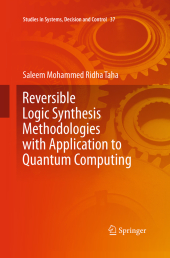 Neuerscheinungen 2016Stand: 2020-02-01 |
Schnellsuche
ISBN/Stichwort/Autor
|
Herderstraße 10
10625 Berlin
Tel.: 030 315 714 16
Fax 030 315 714 14
info@buchspektrum.de |

Saleem Mohammed Ridha Taha
Reversible Logic Synthesis Methodologies with Application to Quantum Computing
Softcover reprint of the original 1st ed. 2016. 2016. xiii, 174 S. 235 mm
Verlag/Jahr: SPRINGER, BERLIN; SPRINGER INTERNATIONAL PUBLISHING 2016
ISBN: 3-319-37383-8 (3319373838)
Neue ISBN: 978-3-319-37383-6 (9783319373836)
Preis und Lieferzeit: Bitte klicken
This book opens the door to a new interesting and ambitious world of reversible and quantum computing research. It presents the state of the art required to travel around that world safely. Top world universities, companies and government institutions are in a race of developing new methodologies, algorithms and circuits on reversible logic, quantum logic, reversible and quantum computing and nano-technologies. In this book, twelve reversible logic synthesis methodologies are presented for the first time in a single literature with some new proposals. Also, the sequential reversible logic circuitries are discussed for the first time in a book. Reversible logic plays an important role in quantum computing. Any progress in the domain of reversible logic can be directly applied to quantum logic. One of the goals of this book is to show the application of reversible logic in quantum computing. A new implementation of wavelet and multiwavelet transforms using quantum computing is performed for this purpose. Researchers in academia or industry and graduate students, who work in logic synthesis, quantum computing, nano-technology, and low power VLSI circuit design, will be interested in this book.
Introduction. Fundamentals of Reversible Logic.- Methods of Reversible Logic Synthesis.- Evaluation of the Reversible Logic Synthesis Methodologies.- Reversible Sequential Logic Circuits.- Quantum Logic Circuits and Quantum Computing.- Wavelets and Multiwavelets Implementation Using Quantum Computing.- Conclusions and Future Researches.


